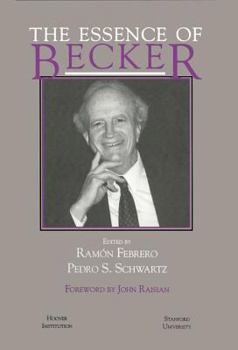The Essence of Becker: Volume 426
Select Format
Select Condition 
Book Overview
This volume presents twenty-six essays that showcase the brilliant originality and range of economic thought that earned Hoover Institution senior fellow Gary S. Becker the Nobel Prize in Economic Sciences in 1992. As the first published collection of Becker's papers, this selection offers an overview of the fundamental theries and unorthodox applications that inspired Milton Friedman to call Becker "one of the most creative economists of our generation" and concludes with the text of Becker's Nobel lecture, a personal survey of his work.
Becker's significant contributions evolve from an economic approach to analyzing social issues that range beyond those usually considered by economists. By questioning assumptions taken for granted in most economic modeling, Becker sheds new light on previously unconnected and poorly understood social phenomena. He relies on this singular axiom: all actors in the social game are economic persons who maximize their advantages in different cost situations. In these essays, Becker studies persistent racial and sexual discrimination investment in human capital, crime and punishment, marriage and divorce, the family, drug addiction, and other apparently noneconomic dimensions of society. Significantly, Becker's findings not only shift huge problems that other social scientists once considered immovable but also stand up to empirical challenge.





